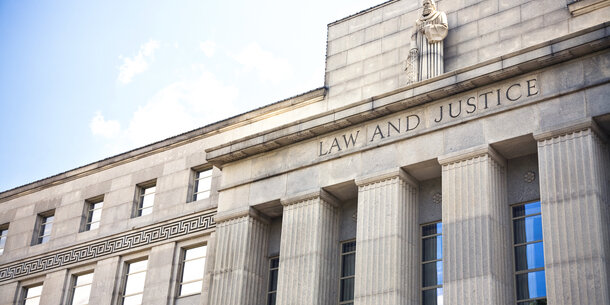DOJ Reopens Office for Access to Justice
On October 29, Attorney General Merrick Garland announced the reopening of the U.S. Department of Justice’s Office for Access to Justice, an office established during the Obama administration to improve access to justice in the civil and criminal legal system.
The reopening of the office, which was quietly shut down during the Trump administration, is part of Garland’s phased strategic plan to “restore and expand the emphasis on access to justice within the department and through the federal government,” according to the DOJ’s press release. The plan was developed by Garland in response to a memo issued by President Joe Biden in May instructing him to expand the DOJ’s access to justice work.
Prior to being shuttered in 2018, the office worked to reform the use of fines and fees by state and local courts, protect the right to counsel for juvenile and indigent defendants, and increase access to civil legal aid for those who could not afford lawyers, according to Law360.
Attorney General Garland said: “There can be no equal justice without equal access to justice. And because we do not yet have equal access to justice in America, the task before us is urgent.”
Biden Announces Ninth Round of Judicial Nominees After Record Week of Confirmations
On November 3, President Biden announced his ninth round of judicial nominees, including nine new federal court nominees. The president’s announcement comes after having a record-setting number of judicial nominees confirmed by the Senate during the last week of October.
Biden’s latest slate of nominees includes eight women, four people of color, and two former public defenders. Four of the nominees, if confirmed, would also be the only Black woman in the Northern District of California, the second Latina nominee to the Southern District of California, the second Latina in the District of New Jersey, and the second Latina in the District of Nevada.
As of this week, the Senate has confirmed 28 of Biden’s 62 federal court nominees, including Myrna Pérez, the former director of the Brennan Center’s Voting Rights and Elections Program. People for the American Way reports that as of October 27, 70% of Biden’s judicial nominees are people of color and nearly 75% are women.
Pennsylvania Supreme Court Election Brings Big Donors, Bar Association Sanctions
On November 2, Republican Kevin Brobson was elected to the Pennsylvania Supreme Court, defeating Democrat Maria McLaughlin in the race to replace Republican Justice Thomas Saylor, who hit the state’s mandatory retirement age.
In all, the race between Brobson and McLaughlin attracted over five million dollars, with Brobson benefitting from nearly $3 million of that spending, including $1.7 million from a group primarily funded by a Philadelphia billionaire. Around $2 million was spent in favor of McLaughlin, and her biggest donors were labor unions and the Philadelphia Trial Lawyers Association’s political action committee.
Over $1.9 million was spent on television ads, with McLaughlin spending the most ($724,540). The Republican State Leadership Committee, a conservative group that is mostly funded by the Judicial Crisis Network, accounted for nearly one-third of the spending on ads in favor of Brobson.
One of the ads run by Brobson’s campaign against McLaughlin was found to have violated the state bar’s advertising guidelines. The campaign re-released an edited version of the ad, which omitted the claim that one of McLaughlin’s “largest donors is indicted by the FBI for political bribery” and added context to a discussion of one of McLaughlin’s rulings.
To Increase High Court Diversity, Maryland Governor Extends Deadline for Judicial Applications
Governor Larry Hogan extended the deadlines for applications to fill two vacancies on Maryland’s highest court “in order to attract as broad a field of candidates as possible consistent with his commitment to diversity and outreach.”
The vacancies on the Maryland Court of Appeals were created by the mandatory retirements of Judges Robert McDonald and Joseph Getty, both of whom will be required to step down in 2022 because of the state’s mandatory retirement age. Appointments to the high court are made by the governor, who chooses from candidates recommended by the state’s Judicial Nominating Commission. Seven applications were submitted for McDonald’s seat and four for Getty’s, but according to the Baltimore Sun, “six of the initial seven applicants [for McDonald’s seat] were men and all appeared to be white.”
Governor Hogan has faced criticism for a lack of diversity in his past judicial appointments. Currently, the 7-person court has three women and four men, and two Black justices and five white justices. The Brennan Center reports that as of April 2021, Maryland was one of 12 states with no Latino high court justices despite Latinos making up over 10% of the state population.

